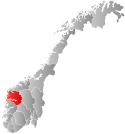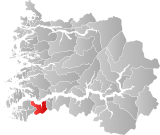Brekke is a former municipality in the old Sogn og Fjordane county, Norway. The municipality has existed two separate times: from 1850 until 1861 and then again from 1905 until its dissolution in 1964. It was located in the northeastern part of the present-day Gulen Municipality in Vestland county. The municipality encompassed about 207 square kilometres (80 sq mi) south of the Sognefjorden, centered on the Risnesfjorden arm that reaches to the south from the main fjord. The administrative center of the municipality was the village of Brekke, located on the southern shore of the Sognefjord, about a 35 kilometres (22 mi) drive from the village of Eivindvik. The main church for the municipality was Brekke Church.[2]
Brekke Municipality Brekke herad | |
|---|---|
| Brække herred (historic name) | |
 View of the village of Brekke | |
 Sogn og Fjordane within Norway | |
 Brekke within Sogn og Fjordane | |
| Coordinates: 61°01′07″N 05°27′41″E / 61.01861°N 5.46139°E | |
| Country | Norway |
| County | Sogn og Fjordane |
| District | Sogn |
| Established | 1850 |
| • Preceded by | Evenvig Municipality |
| Disestablished | 1 Jan 1861 |
| • Succeeded by | Lavik og Brekke Municipality |
| Re-established | 1 Jan 1905 |
| • Preceded by | Lavik og Brekke Municipality |
| Disestablished | 1 Jan 1964 |
| • Succeeded by | Gulen Municipality |
| Administrative centre | Brekke |
| Area (upon dissolution) | |
| • Total | 207 km2 (80 sq mi) |
| Time zone | UTC+01:00 (CET) |
| • Summer (DST) | UTC+02:00 (CEST) |
| ISO 3166 code | NO-1414[1] |
History
The parish of Brekke was originally established as a municipality in 1850 when it was split off from the municipality of Evindvig. Initially, Brekke had a population of 898. In 1861, Brekke (population: 898) was merged with neighboring municipality of Lavik (population: 926) to form the new municipality of Lavik og Brekke. On 1 January 1875, a part of Klævold municipality with 90 inhabitants was moved to Lavik og Brekke.[3]
On 1 January 1905, the municipality of Lavik og Brekke was split (back) into two parts, Lavik (population: 1,182) and Brekke (population: 982). During the 1960s, there were many municipal mergers across Norway due to the work of the Schei Committee. On 1 January 1964, Brekke municipality ceased to exist when it was merged with Gulen, the neighboring municipality to the west, forming a new, larger municipality of Gulen. Before the merger, Brekke had a population of 782.[3]
Name
The municipality (originally the parish) is named after the old Brekke farm (Old Norse: Brekka) since the first Brekke Church was built there. The name is identical to the word brekka which means "slope". Historically, the spelling of the name was not formalized until the 1800s, so spellings such as Breche, Bræcke, and Brække were also used.[4][5]
Government
During its existence, this municipality was governed by a municipal council of directly elected representatives. The mayor was indirectly elected by a vote of the municipal council.[6]
Mayors
- 1850-1855: Ola Mathiasson Asheim
- 1856-1859: Lasse Hermundson Fram-Brekke
- (1861-1905: Part of Lavik og Brekke)
- 1905-1910: Johannes L. Wergeland
- 1911-1916: Ivar Sjurson Haugland
- 1917-1919: Ola K. Indre Oppedal
- 1920-1922: Mons Hanson Ytre Takle
- 1923-1925: Ola K. Indre Oppedal
- 1926-1928: Mons Hanson Ytre Takle
- 1929-1931: Ola K. Indre Oppedal
- 1932-1934: Mons Hanson Ytre Takle
- 1935-1937: Sjur I. Haugland
- 1938-1943: Nils R. Dale
- 1943-1945: Berner Ellingsen
- 1945-1945: Nils R. Dale
- 1946-1959: Torvald Hjellum
- 1959-1963: Tormod Tynning
Municipal council
The municipal council (Heradsstyre) of Brekke was made up of 13 representatives that were elected to four year terms. The party breakdown of the final municipal council was as follows:
| Party name (in Nynorsk) | Number of representatives | |
|---|---|---|
| Labour Party (Arbeidarpartiet) | 2 | |
| Centre Party (Senterpartiet) | 7 | |
| Liberal Party (Venstre) | 4 | |
| Total number of members: | 13 | |
| Party name (in Nynorsk) | Number of representatives | |
|---|---|---|
| Labour Party (Arbeidarpartiet) | 2 | |
| Farmers' Party (Bondepartiet) | 5 | |
| Liberal Party (Venstre) | 6 | |
| Total number of members: | 13 | |
| Party name (in Nynorsk) | Number of representatives | |
|---|---|---|
| Labour Party (Arbeidarpartiet) | 3 | |
| Joint List(s) of Non-Socialist Parties (Borgarlege Felleslister) | 8 | |
| Local List(s) (Lokale lister) | 1 | |
| Total number of members: | 12 | |
| Party name (in Nynorsk) | Number of representatives | |
|---|---|---|
| Labour Party (Arbeidarpartiet) | 3 | |
| Joint List(s) of Non-Socialist Parties (Borgarlege Felleslister) | 9 | |
| Total number of members: | 12 | |
| Party name (in Nynorsk) | Number of representatives | |
|---|---|---|
| Labour Party (Arbeidarpartiet) | 2 | |
| Farmers' Party (Bondepartiet) | 2 | |
| Liberal Party (Venstre) | 2 | |
| Local List(s) (Lokale lister) | 6 | |
| Total number of members: | 12 | |
| Party name (in Nynorsk) | Number of representatives | |
|---|---|---|
| Labour Party (Arbeidarpartiet) | 6 | |
| Joint List(s) of Non-Socialist Parties (Borgarlege Felleslister) | 5 | |
| Local List(s) (Lokale lister) | 1 | |
| Total number of members: | 12 | |
| Note: Due to the German occupation of Norway during World War II, no elections were held for new municipal councils until after the war ended in 1945. | ||
Notable people
- Peder Furubotn (born 1890 in Brekke), a Communist and anti-Nazi resistance leader
See also
References
External links
- Weather information for Brekke Archived 20 September 2009 at the Wayback Machine (in Norwegian)
- Map of the Municipality of Brekke